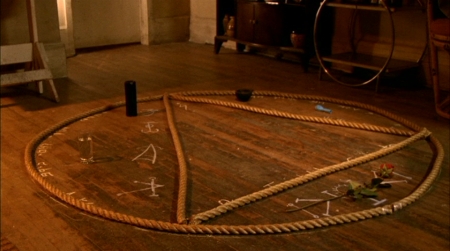BUY IT AT AMAZON: CLICK HERE!
STUDIO: Lionsgate
MSRP: $39.98
RATED: NR
RUNNING TIME: 530 Minutes
SPECIAL FEATURES:
• Selected commentaries
• "Making-of" featurette
• Unaired scenes
The Pitch
“What if Hellblazer
had been licensed by Aaron Spelling?”
The Humans
Paul
Blackthorne, Valerie Cruz.
The Nutshell
Harry
Dresden is a scruffy, down-on-his-luck private investigator whose hobbies
include badgering
the girl, and wizardry. There’s not much call for a freelance wizard in the
himself, sitting around in his jimmies, talking with his pet ghost, and waiting
for the next leggy bombshell to stride through the door with a wad of cash
outweighed by her troubles.
The Lowdown
There’s
something about
employ much deductive reasoning. They have all these nifty tools, see, that
find the results for them. The mysteries aren’t resolved through careful steps
of logic, but through the careful application of science far enough advanced as
to be indistinguishable from magic.

Quit having so much fun while I’m stuck in my basement in the dark, damnit.
Enter The
Dresden Files, which gets even lazier than
charade, and outright attributes everything to honest-to-god magic. This is a
terrible way to write crime fiction, or mystery fiction, because it emphasizes
the tools over the tool-using humans behind them. That’s the generous
interpretation, anyway; the other is that it’s supremely hackneyed writing that
relies on magic tools as devices to resolve conflicts the writer couldn’t bring
to his own satisfying close.
Not that
I have anything against magic being used as a tool in fiction. Hellblazer
tends to run with a noir-ish bent, with magic employed at key moments to
further the story. The difference between John Constantine and Harry Dresden,
at the lowest level, is that
something for nothing.
So, you’re
a wizard. You can use this nifty scrying spell to locate anyone in the world if
you have just a little bit of their
all the time? In some stories, magicians trade away bits of their soul for
access to magic; in others, deals are made with devils to procure just that
little bit of power; hell, in
are limited in what information they can provide. In The Dresden Files the
only cost is the $4.99 plus tax for the packet of powdered eye of newt.

The Power of Three with Less Filigree
Without a
cost attached to his powers, Harry Dresden comes off as nothing more than a
private investigator, but in place of, say, alcoholism or lecherousness or something that adds a wrinkle to his
character he gets his dull, convenient magic powers. This removes great
handfuls of interest that the audience might find in the character. It’s even
worse because there’s nobody else interesting to back him up. There’s only one
major dyad in the show, and that’s between
force, but their relationship is so uneven from episode to episode that it’s
hard to find the spark. (Instead of “Will they or won’t they?” you get “Will
she remember his first name this time or won’t she?”)
The
scripts lean toward darkness — with tales of bound demons wishing to become
mortal, werewolves killing their own bloodline to rid themselves of the
lycanthrope’s curse, and nasty behavior from other monsters of legend — but
without any sort of grounded interest in Dresden, the plots just whirl around
like half-organized clouds. The show plays more like Charmed, despite its best
efforts. Threats appear, and magic saves the day, costarring Harry Dresden.

Nuclear Man went thattaway!
I do have
to commend the writers on one aspect of The Dresden Files, though, and that
probably includes novelist Jim Butcher on whose books the show is based: the
plots twist enough that very rarely is it easy to guess the outcome from the
set-up. From time to time, the one-shot actors get decently emotional, thanks
to these unpredictable strains of story. These situations are almost rewarding
enough to make up for the weakness of the protagonist. And, to clarify, it’s
not Blackthorne’s fault; his acting is well above average, buthis role is
near-pointless.
It’s hard
to hang a whole show on the flimsy frame of a specter, though, which is exactly
what Harry Dresden too often seems to be. He’s a vessel for uninspired magic, a
medium through which machinas spit
their deuses. The Dresden Files takes a
concept promising at least melodramatic interest and turns it into a filthy
liar.
The Package
Selected
episodes contain commentaries from folks associated with the production, but
none are what you’d exactly call compelling. There are also a few unaired
scenes and a making-of featurette. Come on, kids, it’s time to get excited.
(As an
incidental, the “magic” of
with it, don’t you think?)
4 out of 10
